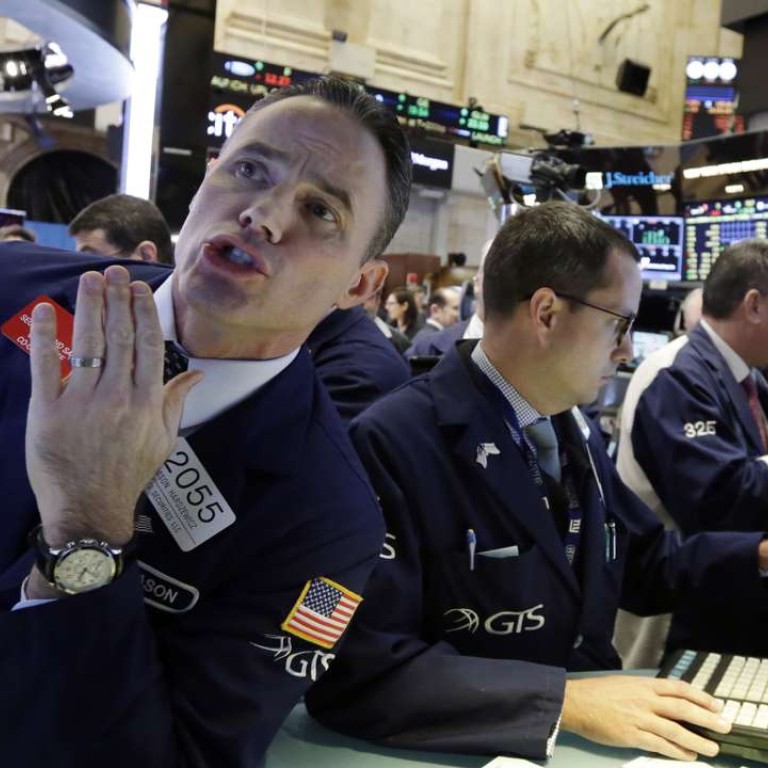
New | Weak China trade data hits global equities to drop to a three-month low, US dollar weakens
Global equity markets slumped to a three-month low on Thursday after disappointing Chinese trade data renewed concerns about the world’s second-largest economy, but rebounding oil prices and the dollar’s market role led US stocks to pare losses.
At their lows, stocks on Wall Street fell almost 1 per cent, and in Europe a bit more, following data that showed Chinese imports in dollar terms had contracted and exports dropped by a sharper-than-expected 10 per cent.
The unexpected trade figures pointed to weaker Chinese demand both at home and aboard while deepening concerns over the latest depreciation in China’s yuan currency, which hit a fresh six-year low against a firming US dollar.
“If the Chinese economy is struggling, it is a problem for the global economy and you’re seeing that reflected in the capital markets, whether it be the strength in the dollar or the volatility in equities,” said Michael Arone, chief investment strategist at State Street Global Advisors in Boston.
Oil prices rebounded. After an initial bearish reading of a US Energy Information Administration report, traders soon focused on sharp inventory drawdowns in distillates, including diesel and heating oil, and a decline for gasoline.
The reversal in oil prices helped turn markets that have traded inversely to the dollar. In recent weeks, the dollar has strengthened on growing expectations of a Fed rate hike, which had weakened stocks, said Michael James, managing director of equity trading at Wedbush Securities in Los Angeles.
“As you’ve seen the dollar pull back today and oil rally off its lows, the two of those combined have seen some macro money rotate into long equity positions,” James said.
“That’s why the (stock) market has rallied off its lows.”

The Dow Jones industrial average closed down 45.26 points, or 0.25 per cent, to 18,098.94. The S&P 500 fell down 6.63 points, or 0.31 per cent, to 2,132.55 and the Nasdaq Composite slid 25.69 points, or 0.49 per cent, to 5,213.33.
In Europe, the FTSEurofirst 300 index of leading regional shares closed down 0.91 per cent to 1,323.95. MSCI’s all-country world stock index of equity markets in 46 countries fell to lows last seen on July 12 before paring some losses to trade 0.46 per cent lower.
In London, mining stocks BHP Billiton and Rio Tinto fell 4.4 per cent and 4.9 per cent, respectively, due to the trade data from China, the world’s biggest metals consumer.

The dollar tumbled from a seven-month high as risk appetite took a turn for the worse on the soft Chinese data, which rattled markets that expect the Fed to boost rates by year-end.
The US currency also fell from a more than two-month high against the yen and Swiss franc, two safe-haven currencies that benefit in times of political or financial stress.
The dollar was last down 0.54 per cent against the yen at 103.62 yen. The euro fell briefly below $1.10 for the first time since July, but quickly recovered to trade 0.40 per cent higher on the day at $1.1050.

A hard landing in China, if that were to occur, would pose a bigger problem to the global economy than a “hard exit” by Britain from the European Union because of China’s greater economic size and trade profile around the world, Arone said.
China concerns could also deter the Federal Reserve from raising US interest rates in December, as minutes released Wednesday from a September policy meeting suggested, he said.
Oil prices initially fell more than 1 per cent after US government data reported the first domestic crude inventory growth in six weeks, a build above market expectations.
Brent crude rose 22 cents to settle higher at US$52.03 per barrel, while US West Texas Intermediate crude rose 26 cents to settle at $50.44.
The weak Chinese data pushed investors to buy safe-haven government debt after two straight days of selling. The 10-year note rose 8/32 in price to yield 1.7481 per cent.
Europe’s benchmark government bond yield retreated from one-month highs after the latest signals from the world’s central banks soothed fears that monetary stimulus could be petering out.
German 10-year yields - the euro zone’s benchmark - fell 3.6 basis points to 0.03 per cent, pulling back from a one-month high hit on Wednesday, according to Tradeweb.

